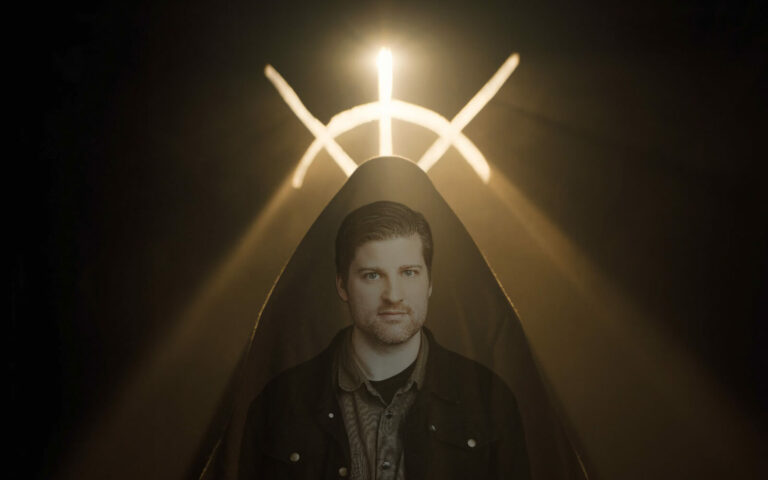By Alexia Bréard-Anderson
Montréal’s premier gathering for electronic music and digital creativity returns with an immersive three-act program bridging AI, XR, Indigenous tech, and ecological imagination.

“That’s an ominous sign,” jokes Brian Sepansky after a crow lands near our table and lets out a few caws. RANGE is sitting down with the Vancouver-based filmmaker to discuss his second short film, In the Shadow of God, which recently won Best Short Film at the prestigious Portland Horror Film Festival. The supernatural horror follows Rachel (Sarah Canning) who, upon the mysterious death of her father, returns to his home only to discover the details of his passing marred by a malevolent terror. Primarily shot on British Columbia’s Sunshine Coast, the film drips with a foreboding feel suited to the wet environs, brutalizing viewers with the same paralysis and disorientation as it does its characters.
Sepanzyk’s journey to In the Shadow of God started long ago, assistant directing on big budget movies (Superman: Man of Steel, Godzilla, Cabin in the Woods), directing music videos (“Bloodmines” – Baptists), and his first short film Compulsion. “I got a taste of film early on. My dad introduced my brother and I when we were kids to movies like Alien and John Carpenter films.” At age 19 he was cast in a zombie movie. Sepanzyk recalls the director encouraging him to write screenplays, saying “it’s free for anyone to write, nothing is stopping you from just writing.”
Sepanzyk’s development as a filmmaker crystallized after he moved to Vancouver and landed gigs in what the film industry refers to as Hollywood North. “You may have to start by changing garbage on set for a year, and work your way up,” he says. ”It can be crushing on bigger shows; you feel far from…that inner creative circle.” But this was his film school where he garnered the experience that prepared him for the indie film world. Every challenge to independent filmmaking is an opportunity to dig into a crew’s creative strengths. “Budget of course is a big one, but it forces you to be creative, spend wisely, and realize you can always find ways of doing it cheap,” Sepanzyk reflects. “[Most] independent films consist of people who believe so much in a project that they volunteer.”

Tan Sierra’s score rolls with deep synths, volleys of clanging percussion, and abrasive orchestral sounds. When asked about Tan Sierra’s identity, Brian answers with a smile: “it’s Nick Yacyshyn (Baptists, Sumac) and myself; it’s our band that we have for the score… It was a fun moniker to use, instead of plastering your own name all over a short film.” Longtime friends and members of Vancouver’s metal scene, Sepansyk describes Yacyshyn as a “Mozart of extreme music.” The two wanted to make a John Carpenter-inspired score with an earthy and abstract edge. They expanded their musical approach “beyond the songwriting we would do in a band context,” says Sepanzyk, by riffing off each other and narrowing in on the sound until it was right.
Sepanzyk’s experience in metal bands Waingro and Running Hills informed his filmmaking. “Playing heavier music has allowed me to play with extremes, and see what’s palatable,” he says. “Music and film have the same goal in that they want to make you feel something. The way you tinker with a setlist to take the audience member on a journey, translates one hundred percent to film.” His musical ear equipped him with an ability to adjust the tempo and dynamics of a sound to serve a scene and evoke the perfect feeling.

In the Shadow of God touches on themes of generational trauma and substance use. “It’s interesting to explore who our families are, where we come from and what we carry with us that we have no control over,” he says. Having witnessed one of his own family members wrestling with alcoholism, he says he’s “seen how something can embody and take control over someone and how it feels like a horror movie.” While not completely autobiographical, Sepanzyk maintains, “if you can write to an experience true for you, maybe you can tap into something others can identify with.”
“The ones who suffer the most are the banished and forgotten,” Sepanzyk says, referring to the film’s title. In the Shadow of God confronts the age-old question of the existence of a divine loving being, especially when families repeat cycles of harm. For Sepanzyk, unsavory stories are “the most interesting, because life is full of dark moments and these themes speak to stuff inside of us.”
Horror unifies people and allegorizes life, all while showing how the human brain operates under duress. It allows audiences to see current social situations mirrored in a story and can provide catharsis. It allows people to experience something profound together. “Everyone has that horror movie that scared the shit out of them when they were kids,” says Sepanzyk. “You can have an audience all scream at a certain moment, or look away in disgust, collectively evoking visceral emotions.”
Sepanzyk is currently finishing up the script as a feature film that elucidates the full dark story. “I would love to make it a six part HBO mini series, kinda like Hereditary meets Seven.”
The vinyl score for the film is also set to be released on new and upcoming label The Garrote, and the film is available on horror streaming service ALTAR.

By Alexia Bréard-Anderson
Montréal’s premier gathering for electronic music and digital creativity returns with an immersive three-act program bridging AI, XR, Indigenous tech, and ecological imagination.
By Adriel Smiley
Ian Mark Kimanje’s powerful documentary traces Carnival’s roots from slavery and survival to global celebration.
By Liam Dawe
With genre-defying bookings and once-in-a-lifetime artist pairings, the 46th edition keeps rewriting the folk playbook.